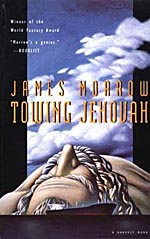
![]() couchtomoon
couchtomoon
7/1/2015
![]()
...opening God's tympanic membranes would not be sacrilegious--heaven wanted this tow... loc. 1208.
A difficult book to grasp. A difficult book to review. James Morrow's 1994 religious satire defies the excessive eye winks and elbow jabs of familiar SF critical humor, a la Pohl & Kornbluth or Pratchett & Gaiman, (calm down, boys, we get it), while also challenging the reader expecting relentless cannonballs lobbed at its religious and conservative targets. While those targets certainly do get their share of bruises, so do the skeptics, and the novel's overall respect for faith, despite the blasphemy, makes this a very different kind of satire.
Haunted by the catastrophic oil spill that ended his career, oil supertanker captain Anthony Van Horne accepts a secret commission by the Catholic Church to tow the 2-mile long dead body of God to its final resting place in a North Pole iceberg. A closely guarded secret, but a faction of scientific socialists and feminists find out about the corpse and interfere with the burial, while Church politics, mystical geographic phenomena, and a mutinous crew threaten Anthony's voyage.
To say it's shocking is mild. Towing the Corpus Dei across the Atlantic is messy business: some bodily dismantling is required to connect Him to the ship, sea creatures nibble at His soft parts, and the superstitious crew boil His warts and pimples into an ointment. And when the load is too heavy and food too low, Morrow twists Holy Communion to its most literal and blasphemous: blood-filled cargo tanks and seared divinity burgers. "The Idea of the Quarter Pounder," they call it (loc. 3179). And "He makes a great compost" (loc. 3510).
But all of this sacrilege is expected. What's unexpected is the depiction of the skeptics: a crew of Marxist overthinkers who employ a club of wealthy war reenactors to bomb the corpse. Led by a feminist research biologist, she will stop at nothing to destroy the body of God-- "evidence that the world was created by the male chauvinist bully of the Old Testament" (loc. 1313). While her arguments are sound, her depiction is unflattering, bordering on sociopathic paranoia. She is an unsympathetic character, while the ship's priest and nun dance on the belly of God in good-natured, global love.
It's an uncomfortable juxtaposition.
(And I might be projecting here.)
There is more going on, but I suspect Morrow's main purpose is to illustrate the absurdity of religious assumptions about human nature- the doom and gloom that comes from both skeptics and believers. When "the Idea of the Corpse" grips the crew, they mutiny, running wild on a bra-shaped island of garbage, in violent and orgiastic splendor:
'whether you were a believer, a nonbeliever, or a confused agnostic, at some level, conscious or unconscious, you felt God was watching you, and the intuition kept you in check. Now a whole new era is upon us.' (loc. 1798)
Meanwhile, the ship's priest runs through the streets crying "Immanuel Kant! ...Immanuel, Immanuel, where are you?" (loc. 2575)
It's a complex piece that reaches far beyond the easy jokes. To say Morrow takes no prisoners is inaccurate- Towing Jehovah is less a shooting range than a mirror, where Morrow displays the futile efforts of his fellow skeptics who take such irrelevant religious matters so seriously, while reminding believers of the power of humanity. It's a reminder that, regardless of what you believe, the Idea of God exists. But so does humanity.
Towing Jehovah is a challenging satire in that it combines respect for its fodder, criticism of itself and its audience, while also displaying a depth of character not typical in normal satirical fare. The blend is... unique. Uncomfortable. Worthwhile.
The Idea of the Corpse. Anno Postdomini One... I fear that we're a plague ship, Popeye. Our cargo's gotten inside us, sporing and spawning, and I'm no longer certain who's towing whom.
http://couchtomoon.wordpress.com